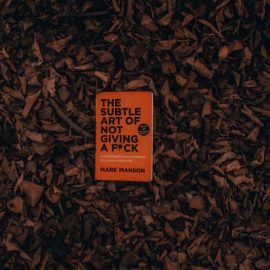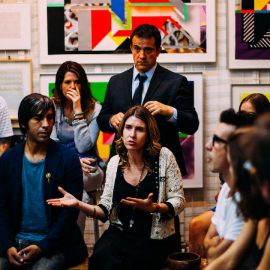

This article is an excerpt from the Shortform book guide to "Flow" by Mihaly Csikszentmihalyi. Shortform has the world's best summaries and analyses of books you should be reading.
Like this article? Sign up for a free trial here .
How do your relationships with others affect your quality of life? How can finding a community help you reach the flow state of mind?
Because we depend on people’s affirmation, learning to improve the quality of your relationships will improve the overall quality of your life. Like any other flow activity, relationships won’t stay enjoyable without adding complexity and challenge to them over time.
Learn how to find flow in your relationships with others.
Finding Flow in Your Relationships
After enjoying your work, the second biggest influence on your happiness is your relationships with others, including friends, family, and community.
From an evolutionary perspective, being together provides safety in numbers, allowing for the survival of more group members. Having people around tends to improve any activity, even tedious work, such as working on an assembly line, and boosts positive emotions. However, some of our most severe upsets come from relationships. For example, unresolved disagreements with your significant other can erode the quality of the relationship. Like most important things in life, relationships are amazing when they work out and distressing when they don’t. Interacting with the same person can be positive or stressful. For example, you might receive a compliment from a supervisor on one of your projects, and later that day, receive criticism from that same supervisor for how you’re managing another project.
Because we depend on people’s affirmation, learning to improve the quality of your relationships will improve the overall quality of your life. You might feel motivated to do this simply in hopes of manipulating people. However, learning to appreciate people for their inherent qualities rather than how they can help you achieve your goals is more important.
Flow in Relationships: Family, Friends, and Community
Now that you understand the function of solitude, we’ll discuss how to improve your relationships with your family, friends, and community.
Family
Three factors shape our connection to our families:
- Biology. As mammals, we depend on our families to take care of us when we’re young and we tend to interact more with our relatives than people outside of our families. When adults feel attached to young and each other, the young survive and the adults pass along their genes.
- Culture. Despite our biological tendency to feel attached to our family members, we may or may not feel attached to them depending on how our culture shapes our interactions. For example, Germany used to be divided into numerous areas of government, each with one of two systems of inheritance: Either a family’s sons divided their family’s estate equally, or the eldest son inherited the whole estate. Though there’s no concrete reason why a location chose a certain system, the expectation created by the system likely affected the relationship among the sons of a family.
- Willingness to invest in each other’s goals. The quality of a family’s relationships depends on how willing its members are to invest in each other’s goals and adjust their behavior. For example, in a romantic relationship, both people have to adjust to align their goals and interests. Something as simple as going out to a restaurant requires coordinating schedules and deciding where to eat.
Romantic Relationship: Starting Off
Maintaining a relationship is similar to playing a game: You agree to abide by a certain set of rules. Though these rules limit your behavior, they allow you to focus on something specific. For example, choosing to have a monogamous relationship limits your romantic and sexual activity to one person, but it also frees you to invest in creating a thriving relationship with that person rather than wondering about potential others.
If you aren’t willing to adjust your behavior to suit your partner, then the relationship might be marred by your reality clashing with your expectations. For example, as a single person, you may have wanted to vacation in Hawaii for a few weeks a year. When you marry and have children, you may not be able to afford this vacation, and it might not make sense to be away from your family for so long. If you don’t modify your old goal to better match your new reality, you’ll feel conflicted. Changing your goals involves reordering your consciousness, and changing yourself.
Romantic Relationship: Bigger Commitments and Goals
Turning family relationships into a flow experience is similar to other flow experiences: You and your partner need to have a unified goal that is complex and meaningful. Deciding to be married and/or have children because you know lots of people doing it might compel you to do those things, but they may not be enough to keep the relationship enjoyable and sustainable. If you do have a child, you need short-term and long-term goals that focus your energy and theirs. For example, you might want to lead a household that adheres to a specific religion, or you might want to help your children excel in school.
Goals should have these characteristics:
- They allow family members to be differentiated and integrated. When family members are differentiated, they’re able to develop their individual talents and pursue individual goals. When they’re integrated, the status of each family member affects the other members. For example, if a child is proud of learning to ride a bike, the other family members should show their excitement for them, too.
- They should be something that all family members are willing to share. If your family doesn’t have any common goals, it’s frustrating to spend time together.
- The challenges increase over time. Like any other flow activity, family relationships won’t stay enjoyable without adding complexity and challenge to them over time. For example, if you’ve been in a romantic relationship for a long time, you and your partner might decide to periodically discuss new topics of conversation, or make new friends.
Increasing Complexity for Teens
Making an effort to increase challenges and skills applies to your relationship with your kids, too. This tends to be easier prior to the teenage years—as a baby develops new skills, such as crawling, parents adjust her surroundings to accommodate, making her life more challenging and more enjoyable.
But when the child enters the teenage years, it becomes harder to provide adequate opportunities. Society isn’t well-structured to help teens challenge themselves either. For example, what challenging opportunities are there for teenagers—apart from school—in a typical suburb? This is why sports can provide an important outlet—it’s one of the only ways suburban teenagers can share their talents and skills outside of the school environment. However, teens still need opportunities to exercise their creativity in a relatively unstructured environment.
Parents can help their teens find meaningful opportunities in four ways:
- Engage in your own complex activities. When a teen is accustomed to a parent doing enjoyable activities such as cooking or carpentry projects, they’re more likely to seek out similar activities for enjoyment and growth.
- Talk about your dreams. Discussing your hopes and dreams with teens can motivate them to work toward their own dreams, even if you didn’t succeed in achieving yours. It shows the teen how to act on opportunities and take steps to realize goals.
- Talk about your lives and the world. Having a conversation with teens in which you treat them as a friend with insights helps them express themselves and become thoughtful people.
- Help them cultivate a sense of acceptance, self-confidence, and control. If a child or teen faces rejection of their parents’ love when they misbehave, they may develop chronic anxiety as an adult. When a teen knows that they’ll be accepted by their family, no matter what, they’re less likely to feel forced to conform to what their peers are doing for acceptance or excitement, and they’re more likely to take appropriate risks that help them grow. At a base level, the teen knows that their parents’ love for them is never in question, though parents should still offer clear expectations for appropriate conduct.
Friends
In contrast to relationships with family members, it’s easier to enjoy friendships because you’re able to choose friends that have similar goals and interests—your friends affirm your current goals. People report their most positive moods with friends and tend to associate friendships with adventure and excitement. In contrast, people tend to associate family with warmth and comfort.
Friendship can be a flow-producing experience because it’s one of the only relationships in which you can fully express yourself. With your family, you may have to fit a certain role, such as being respectful to your parents, or if you’re a parent, providing care to your children. At work, your behavior may be expected to reflect your role. In contrast, with friends, you can afford to show your true self because your goals are similar.
Like other flow experiences, for friendship to be enjoyable, you have to find new challenges to work on together. Intimate friendships are much more likely to provide these experiences. For example, working to understand each other’s uniqueness can be enjoyable. You have to share yourself, and pay attention to them when they do the same.
Note: You’ll have more enjoyable experiences with friends who challenge you and help you grow than with casual friends. If your friends affirm you without questioning you at all, it won’t be as enjoyable. For example, regularly going out with drinking buddies and shooting darts or playing cards might be a pleasurable way to affirm your identity and ward off loneliness, but it won’t bring the same enjoyment that more complex, growth-producing activities do. With drinking buddies, you can participate in the group’s banter and joking, but a lot of the dialogue is predictable and doesn’t produce flow like a more original conversation would.
Developing meaningful friendships takes effort. In childhood and adolescence, when you have ample free time, finding friends can feel easy compared to having to do it as an adult. Many adults express nostalgia for the friends they had growing up but fell out of contact with. You can still find meaningful friendships; just put in the same effort you do with other flow experiences.
Community
Finding belonging in the greater community is a great way to find meaning while helping to make the world a better place. (However, not everyone will have the time and energy to do so; some people are focusing on merely surviving.)
Politics is one avenue that can provide flow. In Ancient Greek society, the term “politics” referred to anything apart from your personal or family life. Though personal and familial challenges can provide flow experiences, successful involvement in politics requires relating to people beyond your immediate circumstances, a much tougher, and potentially more satisfying, challenge. Unfortunately, many politicians tend to seek power, but achieving power is relatively easy compared to helping your community, which means it’s less enjoyable—for optimum enjoyment, help your community.
Other community engagement can produce flow experiences, such as leading a union or starting an initiative to pick up trash. Just make sure to match the experience with your skill level and concentrate on realizing it.
Note: It’s hard to promote social change if you yourself don’t have your own consciousness in order. People who attempt to do so often end up making things worse rather than better. To avoid this, work to order your personal life first.

———End of Preview———
Like what you just read? Read the rest of the world's best book summary and analysis of Mihaly Csikszentmihalyi's "Flow" at Shortform .
Here's what you'll find in our full Flow summary :
- Why people feel the happiest when they're in the "flow state"
- What activities and personality traits promote flow
- Why you may have a paradoxical relationship with work and leisure






